Music at RIT
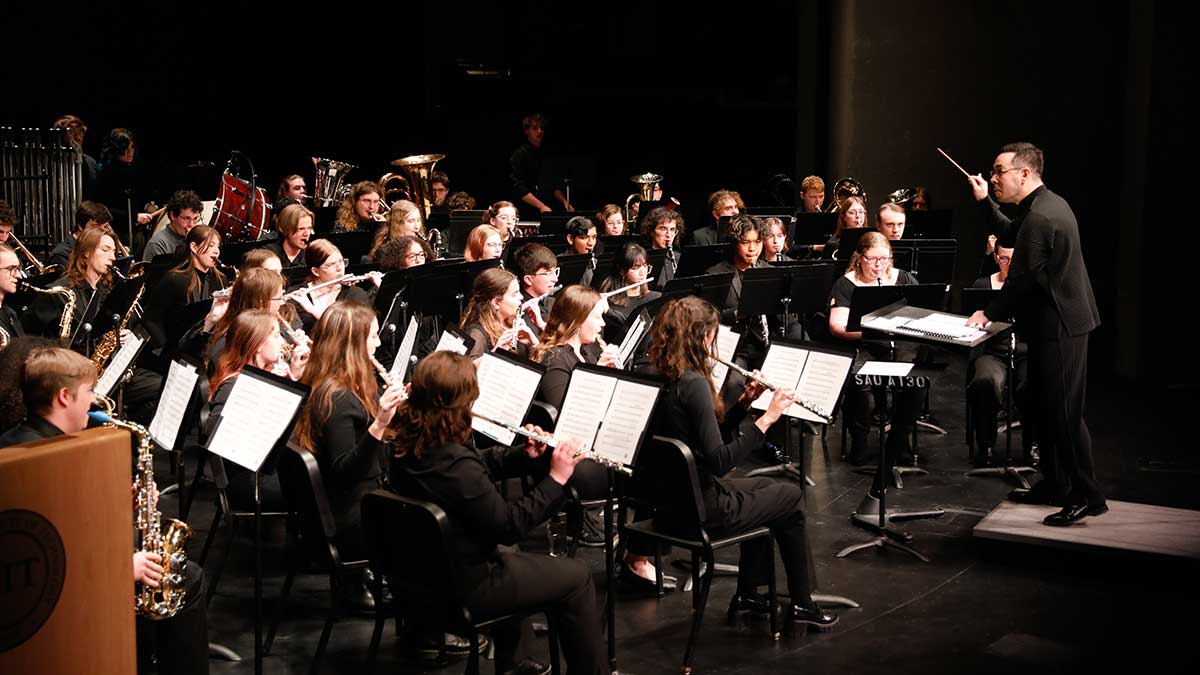
Music at RIT
- RIT/
- Performing Arts/
- Music/
- Music at RIT
Better Living Through Music
For majors and non-majors alike, there are countless ways to study and enjoy music. At RIT, you’ll have the opportunity to pursue whatever ways interest you the most. Study subjects like music theory, composing for video games, or music history. Declare a music and technology minor to learn about audio engineering. Join an RIT ensemble where you can practice and perform for the campus community. Or, customize your education to align with your interests by combining subjects.
Whatever you decide, you’ll have access to world-class faculty and instructors who share your passion for music and will help you grow in your skills and knowledge of the craft.
Music Minors and Immersions
As part of their bachelor’s degree requirements, RIT students must complete an immersion—a concentration of three courses in a particular area. Undergraduate students also have the option of completing a minor, which can complement their major or enable them to pursue an area of personal interest.
Music Performance Minor
Music and Technology Minor
Music Immersion
“I like being able to just make something without any prep work and not having to find a place to put it afterwards. It’s spontaneous and you’re completely in the moment.”
Cassie Volkin A film and animation major from Madison, Ala., plays saxophone in the RIT Pep Band and may join the concert band and take private lessons.
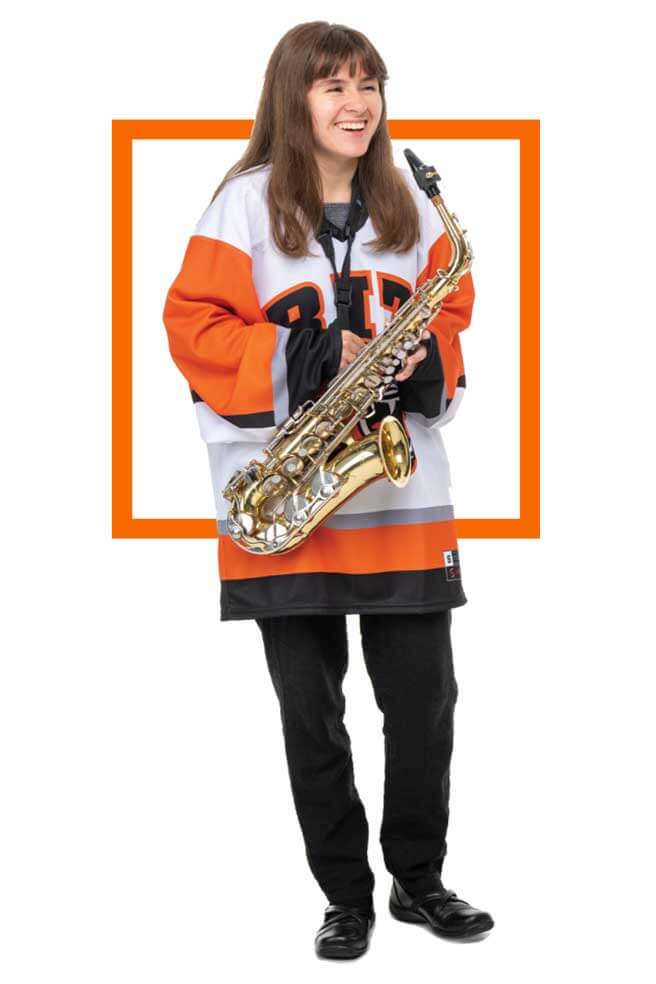
Cassie Volkin A film and animation major from Madison, Ala., plays saxophone in the RIT Pep Band and may join the concert band and take private lessons.
“It’s a way for me to escape stress.”
Chenyang Lin A computer science major from Pittsfield, Mass., has been playing the violin since he was 8 years old. He enjoys playing in the RIT Orchestra and RIT Chamber Orchestra.

Chenyang Lin A computer science major from Pittsfield, Mass., has been playing the violin since he was 8 years old. He enjoys playing in the RIT Orchestra and RIT Chamber Orchestra.
“Music for me is a way of connecting, not just with myself, but with all these amazing people. Whenever I am feeling anything, I pick up my guitar and strum away my feelings.”
Shubhang Mehrotra A computing engineering major from Bareilly, India, has been singing on stage for nearly 13 years and has been playing guitar for about five years.
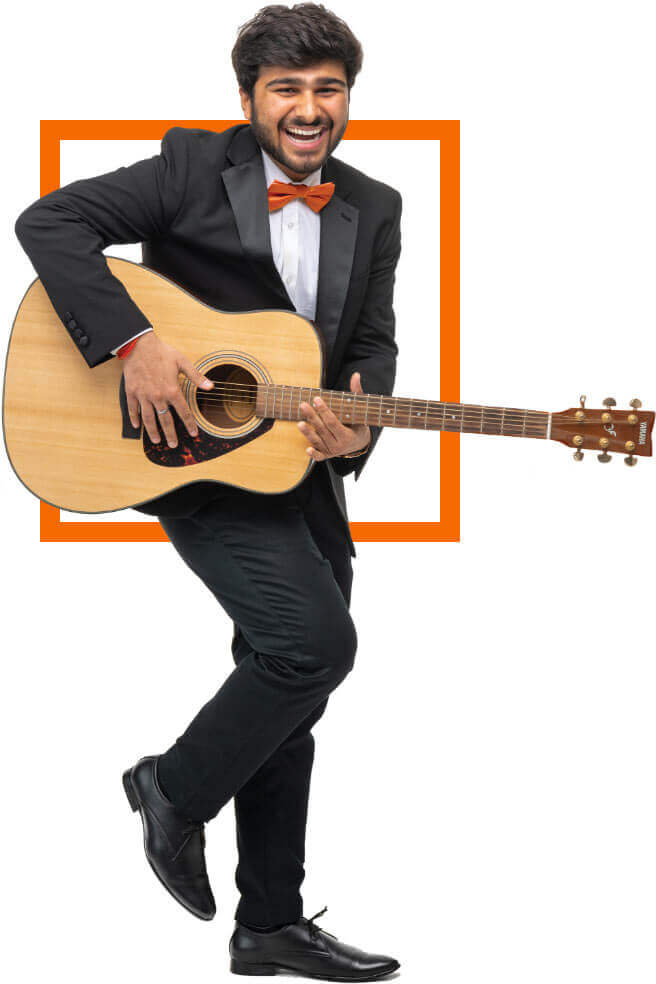
Shubhang Mehrotra A computing engineering major from Bareilly, India, has been singing on stage for nearly 13 years and has been playing guitar for about five years.
“The RIT scholarship honestly was a big factor,” he said about coming to RIT. “It not only allows me to continue my music, but encourages me to do it.”
Josh Gudesblat A percussionist from Downingtown, Pa., is studying mechanical engineering and is in the RIT Pep Band and RIT Philharmonic Orchestra.
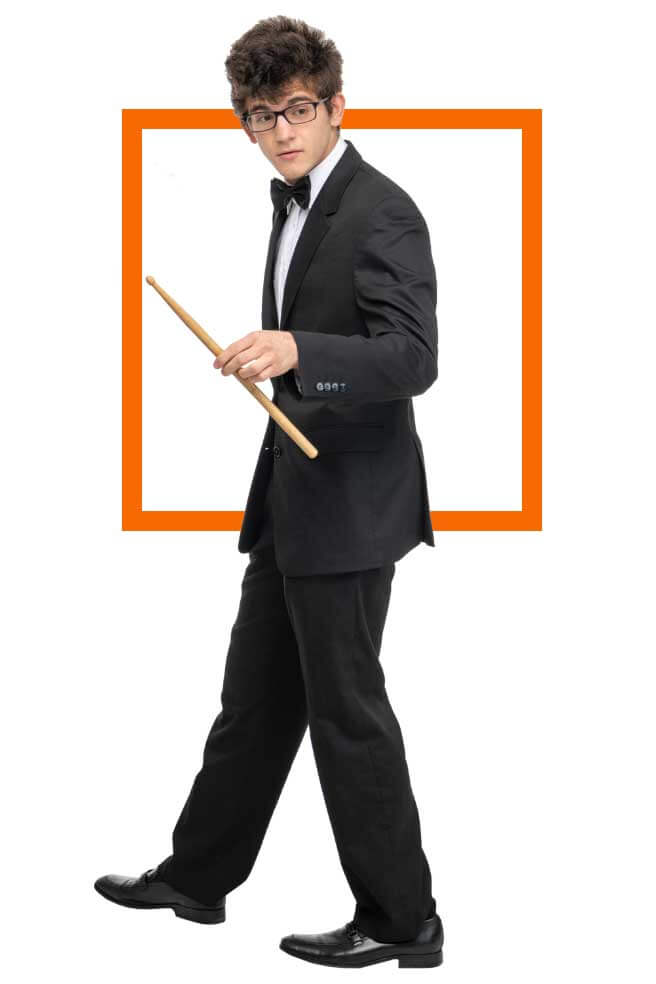
Josh Gudesblat A percussionist from Downingtown, Pa., is studying mechanical engineering and is in the RIT Pep Band and RIT Philharmonic Orchestra.
“I just feel that I can’t stop doing it. I just love sharing my talents and creativity with people.”
Quincy Myles Jr. A computing exploration major from Cheektowaga, N.Y., began playing the trumpet in sixth grade. He also enjoyed musical theater in high school. He is in the RIT Jazz Ensemble, RIT Singers, and RIT Players.

Quincy Myles Jr. A computing exploration major from Cheektowaga, N.Y., began playing the trumpet in sixth grade. He also enjoyed musical theater in high school. He is in the RIT Jazz Ensemble, RIT Singers, and RIT Players.
Private Lessons
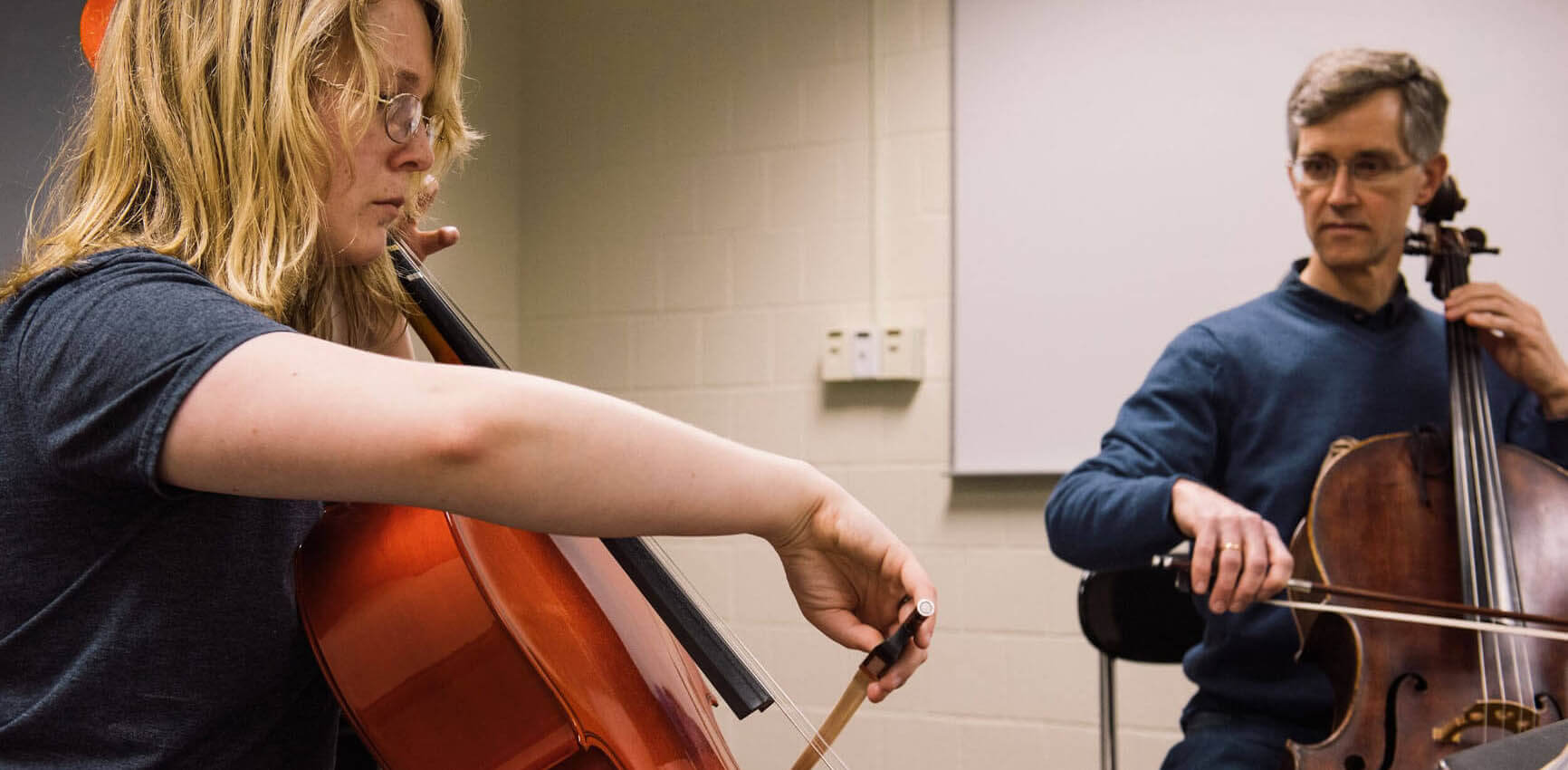
Students can receive private, one-on-one instrumental or voice lessons and participate in studio performance opportunities. Please note that most lessons are offered to support students participating in approved RIT music ensembles and therefore priority is given to ensemble members on a first come, first served basis. However, guitar and piano lessons are open to all RIT students. Interested students should contact performingarts@rit.edu with any questions regarding private music instruction. Please note: A $200 per semester course fee for private lessons will be implemented starting fall 2022.
RIT offers private music instruction for the following instruments:
- Piano (private or group)
- Guitar (private or group)
- Strings (violin/viola)
- Cello
- Clarinet
- Percussion
- Voice (private or group)
- Flute
- Saxophone
- Brass
Please note: A $200 per semester course fee for private lessons will be implemented starting fall 2022.
Applied Music Instructors
Contact the professor via email to enroll in an applied music lesson.
Instructor Name: Jason Tyler Ricks
Email: jtrspa@rit.edu
Biography: Coming soon!
Instructor Name: Joan Kinsella
Email: jmkgla@rit.edu
Biography: Cellist Joan Kinsella has established a reputation as both a teacher and a performer. Dedicated to a performing career focusing on a variety of genres, Ms. Kinsella appears regularly as a chamber musician and orchestral player in upstate New York. Recent performances include Eastman at Washington Square Series, Eastman Presents Series, WXXI’s “Live from Hochstein” broadcast, SUNY Brockport Fine Art Series, Eastman Women in Music Festival, and shows with artists including Seal, Idina Menzel, Josh Groban, and Michael Bublé. She has performed with the national tours of numerous Broadway productions, including Fun Home, Newsies, Pippin, Kinky Boots, Lion King, Phantom of the Opera, and West Side Story. She routinely performs with the Rochester Philharmonic Orchestra, the Rochester Oratorio Society Orchestra, and Geva Theatre Center. Ms. Kinsella has been a member of the Syracuse Symphony Orchestra, the Syracuse Camerata Chamber Orchestra, Gibbs and Main, and ensemble.twenty.21.
As an educator, Ms. Kinsella is passionate about teaching cello and chamber music as well as exploring repertoire from a variety of time periods and styles. She is dedicated to a holistic approach for learning where comfort, body awareness, and mindfulness are integral parts of the physicality of playing a string instrument. Ms. Kinsella focuses on providing tactical systems for improving cello technique and analytical skills for evaluating performance. By developing an ability to conceptualize desired sound, texture, and style, students value these aspects in their playing and recognize the qualities needed for enhancing musical and artistic interpretation.
Instructor: Marcy Bacon
Email: mdbgla@rit.edu
Biography: Clarinetist Marcy D. Bacon jteaches applied clarinet, clarinet techniques, and performs with the Wilmot Wind Quintet at Nazareth College. She is the clarinetist for modern chamber music group fivebyfive, which was recently featured on the cover of City Newspaper and through performances at the Rochester Fringe Festival (2017, 2018 and 2019), WXXI’s Backstage Pass (2018) and WXXI’s Live from Hochstein. She is a member of Fem Vindar [a woodwind quintet], and has played in a number of local and regional orchestras including the Western New York Chamber Orchestra and Rochester Oratorio Society Orchestra. As a member of the flute/clarinet duo VocaSynth, she premiered Cylindrical Sea by Russell Scarbrough at the 2012 National Flute Association Convention in Las Vegas, NV.
Marcy earned a Doctor of Musical Arts degree in Performance and Literature from the Eastman School of Music in 2008 and holds a Master of Music degree from Michigan State University, as well as a Bachelor of Music degree from Portland State University in Portland, Oregon. Principal teachers include Kenneth Grant, Elsa Ludewig-Verdehr and Stan Stanford. Dr. Bacon holds Early Childhood and General Music Level I Certifications from the Gordon Institute for Music Learning (GIML) and has served as the historian for GIML National. Additionally, Marcy is a founding member of the New York State Chapter of GIML (NY-GIML).
Dr. Bacon has presented sessions on wind quintet literature with her Wilmot Wind Quintet colleagues at the New York State School Music Association (NYSSMA) Winter Conference and the NAfME All-Eastern Conference. She has also presented sessions on the topic of audiation as it pertains to both early childhood and instrumental applications at the NYSSMA Winter and Summer conferences. Prior to joining the faculty at Nazareth, Marcy taught applied clarinet and clarinet methods at SUNY Fredonia for seven years. She has taught lessons with the Hochstein School and the Community Music School of the Battle Creek Symphony Orchestra, and general music in the Jamestown City School District and for the Diocese of Rochester. Marcy can be heard on the Oregon Catholic Press label playing sacred music and compositions by Jacob Avshalomov. She lives in Chili, NY where she maintains a private studio.
Instructor: Yuting Liu
Email: ytlspa@rit.edu
Biography: Flautist Yuting Liu is an active musician who performs extensively as a recitalist and chamber musician, giving concerts in many countries, such as China, United States, Canada, Austria, Germany, France, and Australia.
Born in Beijing, China. Yuting began flute studies at the age of 8. Her teachers included Xiaohua Cheng, the co-principal flutist of the China Philharmonic Orchestra and Nikola Todor Atanasov, principal flautist with the Beijing Symphony Orchestra. Her awards in China included winning the First Prizes in Beijing Art Festival solo competitions in 2000, 2001, 2003, and 2004. After moving to the United States, she earned her Bachelor degree at Depauw University, where she studied with Anne Reynolds, winning the Scholarship Music Performance President Award for Excellence and the DePauw University Concerto Competition. Also, Yuting holds two Master degrees. She completed her first Master degree at Indiana University, studying with Thomas Robertello, where she won the Indiana University Jacobs School of Music Artistic Excellence Award. She received the second master degree with French flutist Jean Ferrandis at California State University, Fullerton, where she won the School of Music Scholarship and worked as a teaching assistant in CSUF. Yuting earned Advanced Performance diploma at Eastman School of Music with Merit Scholarship, and work as a teaching assistant.
Yuting was the winner of The 8th Hong Kong International Music Festival Competition and the finalist of the San Diego Flute Guild Young Artist Competition. Her Flute Princess & Animation album won the 16th Top Ten Audiophile Records Award: The Best Instrumental Album of the Year and The Best Art Award held by Guangdong, China Musicians’ Association.
Yuting was the principal flutist in Rio Hondo Symphony Orchestra in Southern California, as well as in the Grand Forks Symphony Orchestra, North Dakota. Recently, she is the cooperative artist of Revival Arts and Media Ltd. Vancouver Canada; and Global Outstanding Chinese Artists Association, San Francisco, United States.
She has presented recitals, performed chamber music, and appeared as soloist with orchestras in such prestigious concert halls as Carnegie Hall, Esterházy Palace, Forbidden City Concert Hall, Chateau of Chantilly, Chartres Cathedral, Mozarteum University Salzburg, China Century Monument Hall, Nanshan Cultural Center Theater Recital Hall, and many others.
Yuting has recorded two of her music albums with Rhymoi Music Record Company: Somewhere in Time released in April 2019; Flute Princess & Animation released in June 2020.
Recently, Yuting has been pursuing Doctorate degree at Eastman School of Music, Rochester. She also holds faculty position teaching at Eastman Community Music School, and secondary teaching at University of Rochester.
Instructor: Robert Varon
Email: rxvspa@rit.edu
Biography: Hi, I’m Rob! I’m a guitarist who specializes in jazz and rock styles who is based here locally out of Rochester. I graduated from the Eastman School of Music with a BM for jazz guitar in December of 2023. I grew up taking lessons, classes, and participated in local ensembles associated with Eastman and the local music scene since the age of 11. This musical education changed the shape of my life and is now helping launch me into my career. I studied with professor Bob Sneider from 2012-2023 - he helped me achieve a lot of my success with milestones such as:
47th Downbeat Magazine Student Jazz Soloist Winner (2023)
47th Downbeat Undergraduate College Rock Group Winner (“Bug Day” - 2023)
42nd Downbeat Student Jazz Guitar Improvisation Winner (2019)
2nd place winner of Wilson Center Guitar Competition in the Jazz Category judged by John Scofield (2019)
Douglas Lowry Scholarship winner presented by the Rochester Music Hall of Fame (2019)
2020 Youngarts Honorable Mention for Jazz Guitar Improvisation
I am excited to progress in my teaching career and help students of all ages and levels. I would be delighted to help you push and achieve your musical goals. Can't wait to meet you here at RIT!
Instructor: Susan Rebeca Boyd
Email: srbspa@rit.edu
Biography: Dr. Rebeca Boyd earned her Doctorate of Musical Arts from the Eastman School of Music as a student of the legendary pedagogue Professor Zvi Zeitlin. Music Education and community outreach have been at the forefront of Dr. Boyd’s artistic development. For over two decades Dr. Boyd has been an instructor of violin and viola at Eastman Community Music School, where she developed innovative string curricula, and provided community outreach through their Pathways Program. Her students have gone on to pursue music in their higher education. As a faculty of the Rochester City School District, Dr. Boyd is bringing her unique expertise into the public schools, providing quality instruction and passing on artistic leadership skills to the students under her guidance.
As an experienced performer Dr. Boyd has participated in artistically diverse projects which merge technology, music, and film. As a member of the Empire Film and Music Ensemble (EFAME), she has been a featured soloist for film scores for the Beal Institute Recording Sessions, and a guest soloist in the Rochester Fringe Festival. She was also a frequent performer at the Women in Music Festival which highlights women composers. She was the Concertmaster of the Weber State Symphony Orchestra in Utah, and has recently served as Concertmaster of the Genesee Valley Orchestra and Chorus.
Dr. Boyd has received outstanding honors in International Competitions and performed at several international music festivals, winning second prize in the Master Player’s International Music Competition (Italy) 2011. In the same year Dr. Boyd made her debut at Weill Recital Hall at Carnegie Hall in New York City as a winner of the Romantic Music Competition of the American Protégé International Competition.
Instructor: Katherine Cheng
Email: kkcspa@rit.edu
Bio: Katherine (Kit Ying) Cheng is a New York-based violinist who has appeared on stage at the Peter Jay Sharp Theatre at Lincoln Center, Carnegie Hall, Alice Tully Hall, David Geffen Hall, Woolsey Hall, and Kodak Hall, and has performed as a soloist with the Juilliard Pre-College Orchestra, the 92Y School of Music Orchestra, the Eastman School Symphony Orchestra, and the Bravura Philharmonic Orchestra. She received a full scholarship for the Taipei Music Academy Festival in 2022, and was a fellow for the Tanglewood Music Festival in 2019, Green Mountain Chamber Music Festival in 2023, and Mostly Modern Festival in 2024. This summer, she will be a fellow for the upcoming 2025 Bowdoin International Music Festival.
Katherine began her violin studies under her father’s tutelage at age three. Before immigrating to the U.S. in 2010 from Hong Kong, she earned an associate and licentiate diploma from Trinity College London, as well as certificates from the Associated Board of the Royal School of Music and the Shanghai Conservatory of Music. Katherine attended the Juilliard Pre-College Division in 2012, where she studied with Elizabeth Chang. She was also a recipient of the Jerome L. Greene Fellowship, Gluck Community Service Fellowship, and Morse Teaching Artist Fellowship at the Juilliard School, where she received her Bachelor of Music degree studying with Frank Huang. Later, she pursued her Master of Music degree at the Yale School of Music, studying with Tai Murray. With a strong passion and dedication for teaching, she was recognized with the Malcolm L. Mitchell and Donald M. Roberts Class of 1957 Prize from Yale, awarded to “an outstanding graduating teaching artist in the Music in School Initiative.” Katherine is currently working on her Doctor of Musical Arts degree with Robin Scott, with a full scholarship at Eastman School of Music. She is also a current Artist in Residence at Valley Manor, and has recently joined the RIT community as an adjunct professor. For more detailed information, please visit her website, katherinecheng.net.
Instructor: Ted Canning
Email: eacwell@rit.edu
Biography: Percussionist and Teaching Artist Ted Canning has done extensive freelance work in the northeast United States. His work includes performing classical music, theater, big band and jazz. Performances on stage, in workshops and residencies at schools, colleges and community settings happen throughout Western New York and Pennsylvania.
Ted uses music to teach fundamental curriculum skills such as math, language skills, social studies, history and science, illuminating concepts to students and opening doors to other styles of learning. He has performed with national champions “Phase II Pan Groove” in Trinidad and Tobago, as well as in Europe, in Latin America and with numerous steelbands in Brooklyn, New York. Ted now leads the Panloco Steelband , the “Steel Alchemy” Community Steelband and the RIT (Rochester Institute of Technology) Steel Band. He performs with the Trinidad and Tobago Steelband, and has performed with “pan” players from Trinidad and around the world.
Instructor Name: E-Na Song
Email: ensspa@rit.edu
Biography: Korean-born pianist, Dr. E-Na Song is a concert pianist, collaborative pianist, and educator. As an active performer, Dr. Song has performed throughout the United States, Poland, Spain, Austria, and Korea. Recently she has appeared in venues such as Weill Recital Hall (Carnegie Hall), Kodak Hall at Eastman Theatre, and Hochstein School. When she is not performing or teaching, Dr. Song works as the Assistant Director of the Rebecca Penneys Piano Festival (RPPF).
Dr. Song loves presenting a variety of music and styles to audiences. She recently performed for Live from Hochstein Concert Series, “Celebration of Dance,” broadcast on WXXI Classical 91.5 FM, featuring dance-inspired music by Beethoven, Kodály, Liszt, and Albright. As an active collaborative pianist, she performed in a Soprano Concert, “Returning Home,” in the Weill Recital Hall with music by Schubert, Schumann, Wolf, Debussy, Sibelius, Cipullo, and Won-Ju Lee, as well as Korean folk songs. She recently gave a concert, “Teacher, Student, and a Virtuoso,” including music by Leek and Franck, with her violinist colleague at Nazareth College in Rochester, NY.
Currently, Dr. Song is a piano faculty at Roberts Wesleyan University, the Hochstein School, and Roberts Community Music School. She concurrently holds a collaborative pianist position at SUNY Geneseo and Eastman Community Music School.
Dr. Song earned her Bachelor’s Degree from Seoul National University, which is the most prestigious university in South Korea, under Professor HyungBae Kim. She completed both her Master’s and Doctorate of Music in Piano Performance and Literature at the Eastman School of Music under the tutelage of Professor Rebecca Penneys.
Instructor: Beata Golec
Email: bxggla@rit.edu
Biography: Dr. Beata Golec,
Dr. Beata Golec, a Polish-born pianist, theorist, and composer, enriches the Upstate New York music scene through her teaching and collaborations with choral ensembles at SUNY Geneseo, RIT, and the Diocese of Rochester. Recognized for her outstanding contributions, she received the 2020 SUNY Chancellor's Award for Excellence in Teaching, the 2024 Victor Business Awards, and the Ontario County ATHENA Leadership Awards.
In 2025 she was the sponsor of Unmasking the Silence Suicide and Mental Health Awareness Charity Ball and 40th Ontario County ATHENA Leadership Awards. Golec was the cover woman of the December 2025 Rochester Woman Magazine issue.
Dr. Golec, a dedicated piano instructor at SUNY Geneseo and Rochester Institute of Technology, weaves her passion for music into the fabric of her students’ lives. With expertise honed through roles on boards of examiners for Advanced Placement in Music Theory and International Baccalaureate in Music, she shapes the next generation of musicians. Her influence extends beyond academia as she serves as the music director at Holy Cross and Our Mother of Sorrows Churches in Rochester, NY. Through her leadership, she nurtures a community spirit, guiding choirs to elevate worship experiences. Dr. Golec’s commitment to education and faith demonstrates her belief in the transformative power of music, fostering both personal growth and collective harmony in every note played and every student inspired.
Dr. Golec founded Golec Music Studio in Victor, NY, with a mission to inspire and nurture the next generation of artists. At the studio, students of all ages and skill levels can explore a diverse range of musical disciplines, from piano and voice to intricate music theory and composition. The studio also offers specialized services, including Advanced Placement and International Baccalaureate exam preparation, ensuring students are well-equipped for academic challenges. Beyond traditional lessons, Golec Music Studio provides comprehensive support for college auditions and music theater preparations, helping aspiring performers shine on stage. With a focus on competition readiness, recordings, and transcriptions, Dr. Golec’s expertise extends to creating unforgettable musical experiences for weddings, funerals, and corporate events. At Golec Music Studio, students don’t just learn music; they build confidence, creativity, and a lifelong appreciation for the art.
At 13, Golec's journey into the world of composition began. By 16, she captured the attention of the music community with her piece “Fantazja Polska,” a heartfelt tribute dedicated to Pope John Paul II. This composition earned her a prestigious honorable mention at the “Patri Patriae” All-Polish Composers Competition, marking her official recognition as a composer. “Fantazja Polska” was premiered in 1997 at the Ars Cameralis Silesiae Superioris Festival in Katowice, Poland, performed by the duo Beata Golec and Miroslaw Makowski. The score of this piece was preserved in the Vatican.
Golec's contributions to the annual Women in Music Festival in Rochester, New York, have made a significant impact on the contemporary music scene. Among her showcased works are "Four Preludes" and "Phobia," both evocative pieces for piano, alongside a rich array of compositions like "Forests," "Toccata," and the atmospheric "Clouds," which brings together marimba and vibraphone. Her versatility is further exemplified in "Toccata No. 1" for organ solo and the dynamic "Minimal Talk" for trumpet and piano. The haunting beauty of "Ocean" and the introspective "Falling" round out her impressive repertoire. Serving as the assistant director during the 2011-2012 season, Golec played a pivotal role in supporting and promoting women's voices in music, fostering a community of creativity and collaboration. Her work continues to inspire both performers and audiences alike.
In the spotlight from October 2006 to April 2007, Golec captured hearts as the Artist of the Month at the prestigious Bradshaw and Buono International Piano Competition. She won first prize in 2005 and 2006. In 2007, she continued to shine, earning the second prize—a testament to her dedication and artistry in the world of piano.
Dr. Golec is an active performer. She debuted at Carnegie Hall in May 2005 and performed there again in 2006. She enjoys performing solo, as well as collaborating with vocalists, instrumentalists, orchestras and choirs. She has performed in a master class and concert settings for
world-renowned musicians such as: Marvin Hamlisch, Alicia de Larrocha, Angela Hewitt, Blanca Uribe, Rebecca Penneys, Yong Hi Moon, Malcolm Bilson, Philip Jenkins, Boaz Sharon, Michael Torke and Judith Lang Zaimont.
Golec performed at the following venues: Carnegie Hall, NYC, Bosendorfer Saal, Vienna, Austria, Women in Music Festival, Rochester, NY, Chautauqua Festival, Chautauqua NY, Lenna Hall, Chautauqua NY, Kilbourn Hall, Rochester, NY, Eastman Theater, Rochester, NY, State University of New York in Geneseo, Genesee Community College, Batavia, NY, Make a Wish Foundation (gala concerts in Rochester and Niagara Falls), Rotary Club (Buffalo, Rochester), Garret Club (Buffalo, NY), Ellicott Square Building, Buffalo NY, Dante Alighieri Society, Buffalo, NY, Women's Club in Jamestown, NY, Villa Maria College, Buffalo, NY, University at Buffalo, Buffalo, NY, Canisius College, Buffalo, NY, Eastman House, Rochester, NY, Nazareth College, Rochester NY, University of Syracuse, Syracuse, NY, Fryderyk Chopin Academy of Music, Warsaw, Poland, K. Szymanowski Academy of Music, Katowice, Poland, Classics on Elmwood Concert Series, Buffalo, NY, Rowan University, NJ, Temple University, PA, Roberts Wesleyan College, Rochester, NY, Town Hall in San Sebastian, Spain, Piano Festival and Masterclasses, Prague, Czech Republic, Ars Cameralis Silesiae Superioris, Katowice, Poland, Polish National Philharmonics, Warsaw, Poland, Silesian Philharmonics, Katowice, Poland, Chopin’s Manor House in Duszniki Zdroj, Poland, Lazienki Krolewskie in Warsaw, Poland and Czech Institute in Warsaw, Poland.
More info:
www.beatagolec.com
https://www.rochesterwomanonline.com/index.php/2025/12/09/composing-lifes-symphony-the-story-of-dr-beata-golec/
Instructor: Anne Kunkle
Email: aekspa@rit.edu
Biography: Anne Kunkle bio coming soon!
Instructor: Natalie Fuller
Email: nfsspa@rit.edu
Biography: Natalie Fuller began playing the piano at the tender age of 4, and trumpet followed 2 years later. Born and raised in Saskatchewan, Natalie’s 12 years of homeschooling allowed her the freedom to travel across Canada and the United States as well as internationally to Great Britain and Japan with award winning ensembles including the Regina Lions Band (Bob Mossing) and the South Saskatchewan Youth Orchestra (Alan Denike). A short six months after being diagnosed with cancer, Natalie went on to achieve the highest mark in Canada for the Associate of the Royal Conservatory of Toronto diploma in trumpet performance, under the tutelage of Sharie Argue.
At the University of Regina in Saskatchewan, Natalie studied under Dr. Ed Lewis (CBC Radio’s “Jazz Doctor”) and Miles Newman (principal of the Regina Symphony Orchestra). After completing the bachelor’s degree in just three years, Natalie was awarded the President’s Medal, the highest distinction upon graduation. Natalie then moved to Rochester, New York where she studied with the renowned James Thompson at the Eastman School of Music for both a masters and doctoral degree. During her time there, Natalie won 1st place in the brass division of the Canadian Music Festival and placed in the top three at the American National Trumpet Competition several times.
Natalie has performed for a wide variety of audiences, including notable trumpet greats like Stephen Burns, Tom Stevens, John Wallace and Mark Gould to dignitaries including the Governor General of Canada and even Prince Charles. Whether in an ensemble or performing solo with her sister Maria Fuller (an accomplished pianist with a Masters degree in piano performance from the University of Cincinnati College-Conservatory of Music), Natalie loves to play her trumpet. The Fuller Sisters’ repertoire includes a wide range of styles and eras, but Natalie specifically enjoys researching and presenting music that is relatively unknown and off the well beaten trumpet path. Natalie and Maria are currently working on a recording project that would include several of these pieces. in 2015 Natalie won the second trumpet/assistant principal trumpet chair with the Regina Symphony Orchestra and continues to play with them for their Masterworks Series.
Teaching is equally important to Natalie and she maintains an active studio of talented trumpeters. Young or old, beginner or advanced, Natalie is devoted to her students and relishes in their accomplishments. Recently, Natalie has taught at the University of Rochester, Eastman Community Music School and Cornell University. After completing a one year contract as head of brass at Montana State University Natalie returned to Saskatchewan where she taught privately and for the University of Regina. In the spring of 2016 Natalie married the love of her life and transitioned back to Western New York where she is currently teaching brass and theory at the College at Brockport (State University of New York) and Hobart and William Smith Colleges.
Instructor: Jessica Best
Email: jabgla@rit.edu
Biography: Jessica Best is a versatile artist bridging opera, jazz, and musical theater; singing performances across the globe. Her operatic performances include: LA Opera, Opera Tampa, Buffalo Opera Unlimited, Nickel City Opera, Salt Marsh Opera, and The Center for Contemporary Opera. She is a featured artist with The Buffalo Philharmonic and Chorus and The New Jersey Festival Orchestra. Ms. Best has been featured at Birdland Jazz and the Savannah Music and VOICE Festivals. She is known for her nuanced interpretation of Carmen, as well as Mrs. Otis in The Canterville Ghost, Alice Ryley, Madeline in Three Decembers, and The First Prioress in Dialogues of the Carmelites. Ms. Best sing Bessie and Mary Rivers on the Naxos album of, Jane Eyre, by Louis Karchin. Ms. Best is a three time soloist at Carnegie Hall and tours the country singing The Great American Songbook. Ms. Best is pleased to join the voice faculty at RIT and SUNY Fredonia. Best holds a Bachelor of Music in Vocal Performance from Nazareth College and a Master of Music in Vocal Performance from Northwestern University. She is a member of AGMA and AEA.
Instructor: Gino Pinzone
Email: gppspa@rit.edu
Biography: Gino Pinzone is a classically-trained baritone from Buffalo, New York. Currently, Gino is a Doctoral candidate studying voice at the Eastman School of Music, in the studio of Dr. Jonathan Retzlaff. He has sung leading roles with the Salzburg Festspielhaus, Canadian Opera Company, Cincinnati Opera and San Francisco Opera. He is a graduate of the Crane School of Music at SUNY Potsdam and received his Masters Degree in Voice from the Cincinnati College-Conservatory of Music. He has had a private studio since 2012 and former students have performed on Broadway, national tours and various professional opera companies.
Ensembles
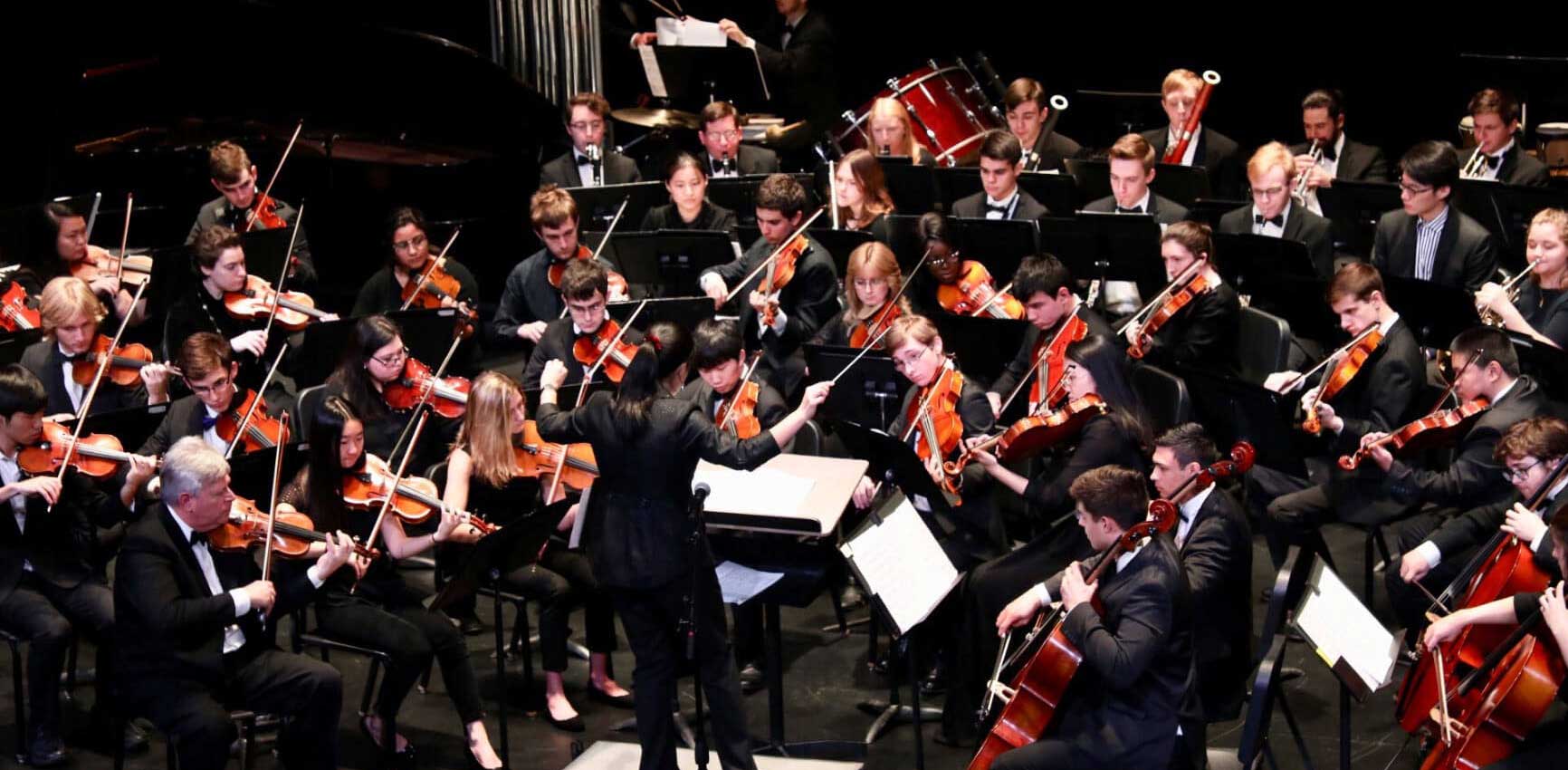
RIT is home to a diverse array of music ensembles and small groups, some of which offer academic credit including: Orchestra, Concert Band, Jazz Ensemble, RIT Singers, and the West African Percussion Ensemble.
Auditions for each ensemble are typically held at the beginning of each semester. For audition details, as well as other information, please click on any ensembles of interest below.
Popular Music Collective
The RIT Popular Music Collective provides collaborative opportunities for musicians, producers, recording engineers, artist managers, promoters, graphic designers, music journalists, marketing teams, and arts entrepreneurs to work together to promote music on campus. Students have access to rehearsal space in the Annex, live sound and lighting equipment training, bi-weekly songwriting workshops and weekly jam sessions. Whether your aspirations are as an artist or as a part of the team that drives the entertainment industry, there are many opportunities to participate!
Music Rooms
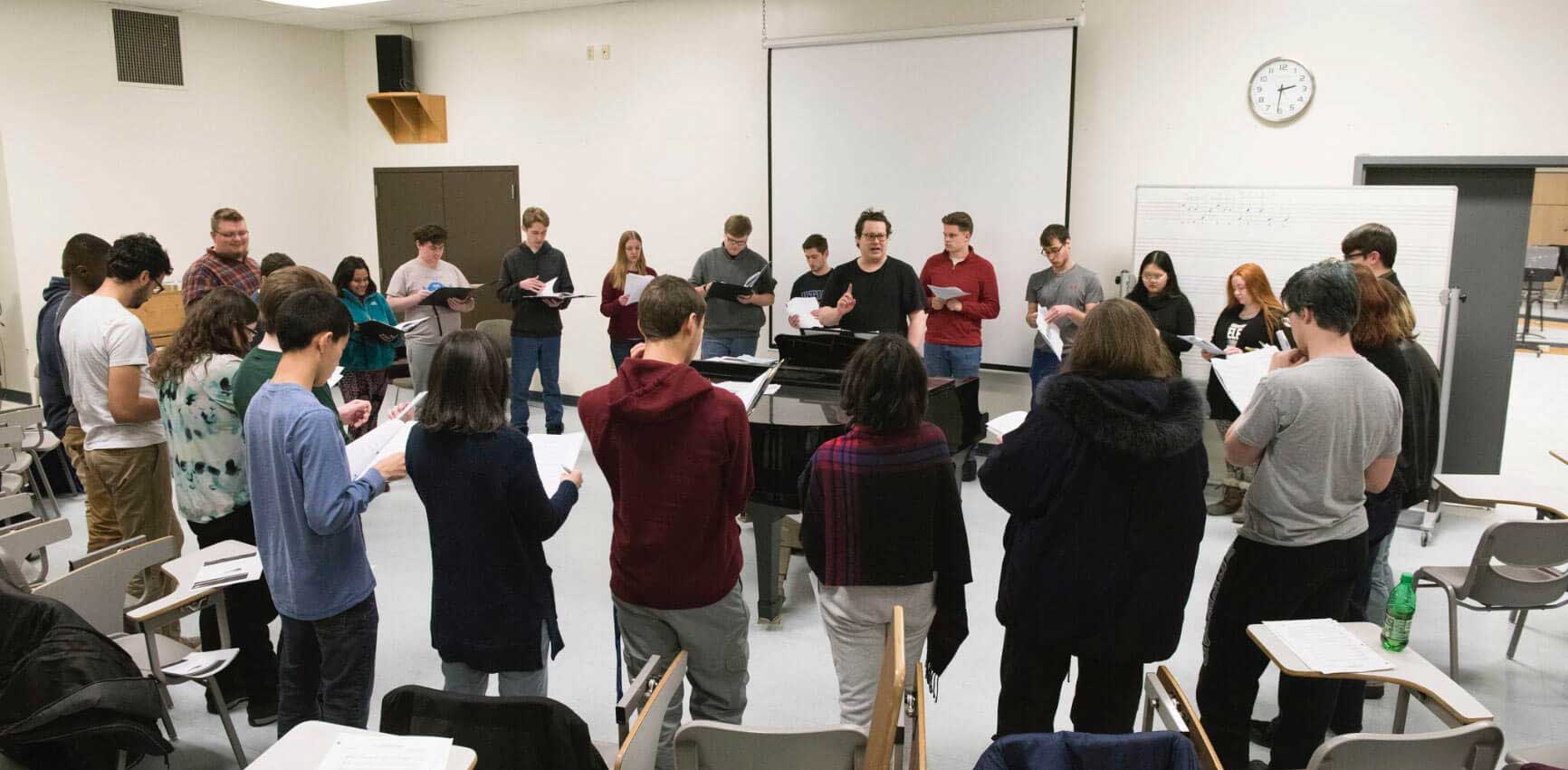
The School of Performing Arts has many designated music practice/rehearsal rooms on campus, including the SHED, Student Alumni Union, Liberal Arts Hall, and more!
Learn about Rehearsal Facilities and Reservation Policies
Instrument Storage and Instrument Loan Policies
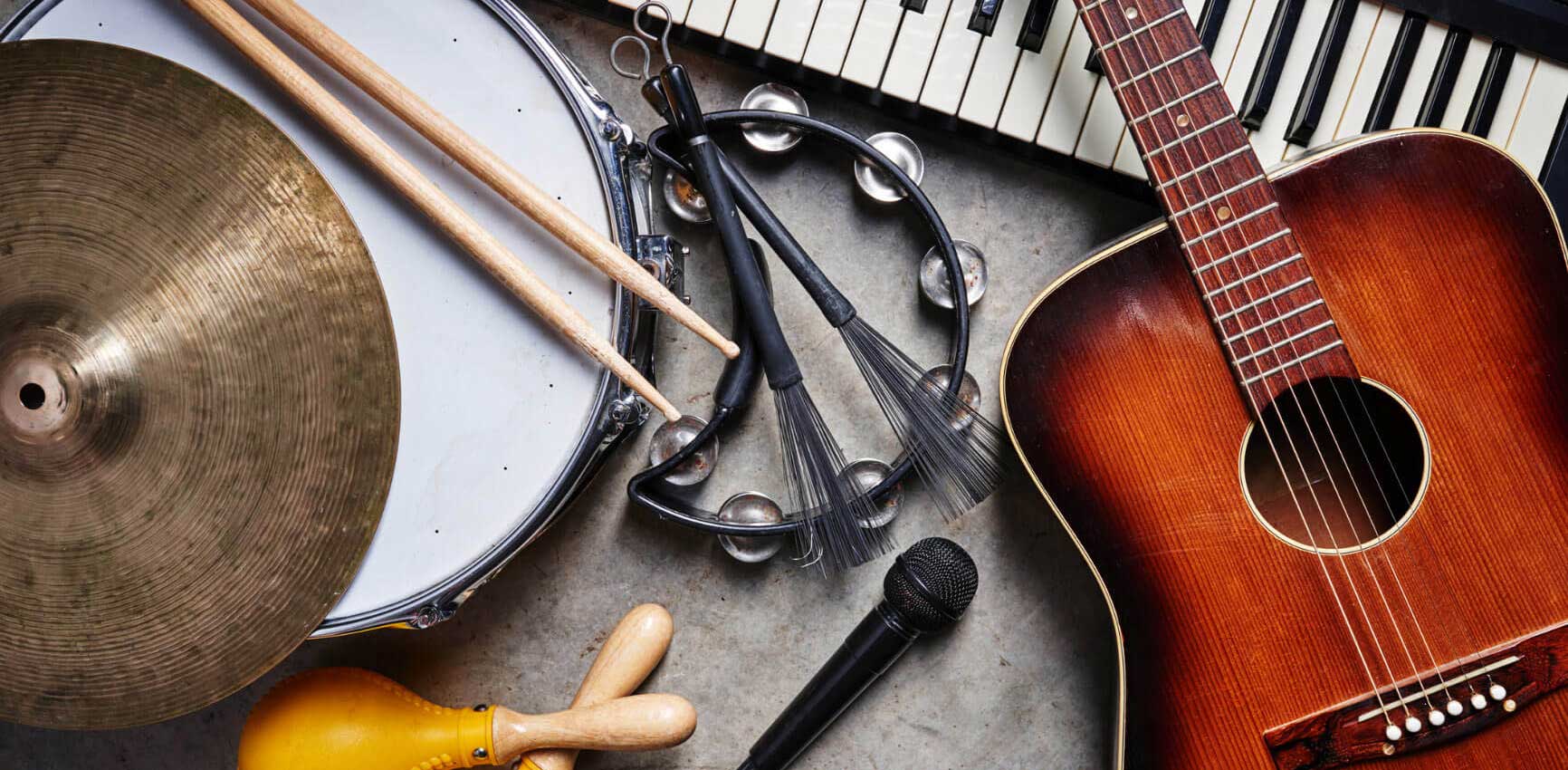
The RIT Music Program owns a variety of instruments for student use. These include all of the standard instruments used in Concert Band, Orchestra, and Jazz Ensemble. Availability of the instruments is based on seniority and need in the ensemble.
Students who receive approval to borrow an instrument owned by the RIT Music Program will be required to sign a form that provides that the borrower is liable for damage to or loss of the instrument. Please contact Michael Dwyer if you would like to check the availability of an instrument owned by the RIT Music Program.
Drum Set Policy: The RIT Music Program owns two drum sets. Only students currently enrolled in an RIT Music Program ensemble are permitted to use these drum sets. RIT is unable to store student-owned drum sets at this time.
Amplifier Policy: The RIT Music Program owns bass and guitar amplifiers. Only students currently enrolled in an RIT Music Program ensemble are permitted to use these amplifiers. RIT is unable to store student-owned amplifiers at this time.
Instrument Storage Policy: There are several instrument storage cabinets in the A130 Music Room. Availability of storage for a personal instrument is based on a first-come, first-served basis with preference being given to students enrolled in the RIT Music Program ensembles. Storage for personal drum sets or other large percussion instruments is not available. Please contact Michael Dwyer if you would like to check the availability of an RIT Music Program instrument storage cabinet.
